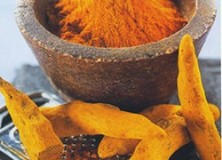
Known best as the substance in turmeric that gives the curry spice its characteristic yellow color, curcumin has been found by previous studies to exert antioxidant, anti-inflammation, anticancer, and lipid-lowering effects. AB Scholey, from Swinburne University (Australia), and colleagues enrolled 60 healthy men and women, ages 60 to 85 years, in a study in which subjects received either 400 mg per day of curcumin, or placebo, for four weeks. One hour after the first dose, parameters of attention and memory improved in the group receiving curcumin. As well the curcumin-supplemented group reported an average 1.82% decrease in fatigue, whereas fatigue increased by 17% in the group receiving placebo. Self-reported calmness and contentedness also improved in the group receiving curcumin. Submitting that: “the first study to examine the effects of curcumin on cognition and mood in a healthy older population or to examine any acute behavioral effects in humans,” the study authors write that: “Results highlight the need for further investigation of the potential psychological and cognitive benefits of curcumin in an older population
Cox KH, Pipingas A, Scholey AB. “Investigation of the effects of solid lipid curcumin on cognition and mood in a healthy older population.” J Psychopharmacol. 2014 Oct 2. pii: 0269881114552744.


